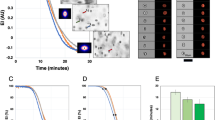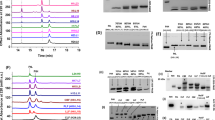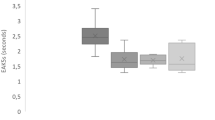Abstract
ERYTHROCYTE catalase can be assayed in the usual quantitative way as well as by qualitative starch-gel and starch-block electrophoresis1–3. The electrophoretic method permits a more subtle characterization of its normal and abnormal properties. In comparative examinations of catalase from cord blood and blood samples of abnormal haemoglobin carriers, no abnormal electrophoretic behaviour could be observed3. An atypical catalase was identified recently by a somewhat slower electrophoretic mobility in some members of a Caucasian family4.
This is a preview of subscription content, access via your institution
Access options
Subscribe to this journal
Receive 51 print issues and online access
$199.00 per year
only $3.90 per issue
Buy this article
- Purchase on Springer Link
- Instant access to full article PDF
Prices may be subject to local taxes which are calculated during checkout
Similar content being viewed by others

References
Thorup, O. A., Strole, W. B., and Leavell, B. S., J. Lab. Clin. Med., 58, 122 (1961).
Bauer, E. W., J. Lab. Clin. Med., 61, 166 (1963).
Blumberg, A., and Marti, H. R., Klin. Wschr., 40, 842 (1962).
Bauer, E. W., Science, 140, 816 (1963).
Author information
Authors and Affiliations
Rights and permissions
About this article
Cite this article
KLEIHAUER, E., BRANDT, G. Qualitative Estimation of Erythrocyte Catalase by Starch-gel Electrophoresis. Nature 204, 478–479 (1964). https://doi.org/10.1038/204478a0
Issue Date:
DOI: https://doi.org/10.1038/204478a0
This article is cited by
-
Methodik und Ergebnisse der qualitativen Katalaseuntersuchungen im Stärkegel
Blut Zeitschrift für die Gesamte Blutforschung (1968)
-
Kristallisation von reinen fetalem Hämoglobin aus menschlichem Nabelblut
Blut Zeitschrift für die Gesamte Blutforschung (1967)
Comments
By submitting a comment you agree to abide by our Terms and Community Guidelines. If you find something abusive or that does not comply with our terms or guidelines please flag it as inappropriate.


